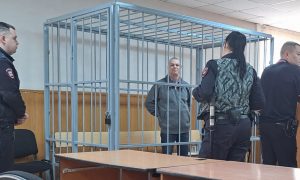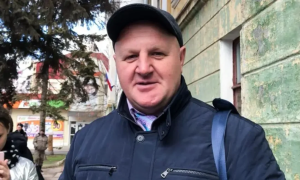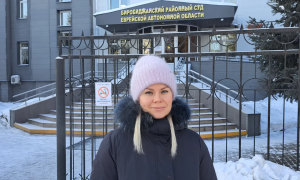Russia’s forced dissolution of local communities, literature bans, and “extremism” prosecutions increasingly restrict Jehovah’s Witnesses’ freedom of religion and belief. On 16 January, their national Administrative Centre in St Petersburg lost its latest legal challenge of a prosecutors’ warning threatening it with liquidation.
Russia’s forced dissolution of communities, bans on literature, and criminal proceedings for alleged “extremism” increasingly restrict Jehovah’s Witnesses’ freedom of religion and belief. On 16 January, their national Administrative Centre in St Petersburg lost its latest legal challenge of a prosecutors’ warning threatening it with liquidation.
A large-scale “unplanned inspection” by the Justice Ministry of the Administrative Centre’s documentation and activities is due to be completed by 27 February. Russia’s Deputy General Prosecutor Viktor Grin claimed on 27 January that the Administrative Centre’s “structural subdivisions” have engaged in “extremist activity” since his 2 March 2016 warning, and specifically mentions the dissolution of local Jehovah’s Witnesses as “extremist organisations”.
Jehovah’s Witnesses fear that the inspection is intended to prepare the Centre’s liquidation ahead of the expiry on 2 March of a warning of “the inadmissibility of extremist activity” (see forthcoming F18News article).
On 9 February, the Supreme Court upheld a decision to dissolve the Birobidzhan congregation as “extremist”. On 10 February, a ninth local Jehovah’s Witness organisation, in Cherkessk in the North Caucasus, was declared “extremist” and ordered to be liquidated. Its property, like that of other liquidated communities, will be confiscated by the state. Another community, in the Kirov Region, may soon face similar proceedings after prosecutors announced that they were preparing a liquidation suit (see below).
In January the Arkhangelsk Jehovah’s Witness community was voluntarily dissolved, after coming under heavy pressure from the local government, law enforcement agencies and Moscow Patriarchate “anti-sect” activists (see below).
39 warnings and 10 liquidations in 24 regions, just one successful appeal
A total of 39 warnings and cautions of the “inadmissibility of extremist activity” in 24 regions are known by Forum 18 to have been issued to Jehovah’s Witness local religious organisations since late 2007. Although Jehovah’s Witnesses frequently challenge these warnings and cautions in court, Forum 18 knows of no instance in which this has been successful. Ten communities have subsequently been ordered to be liquidated (see Forum 18’s “extremism” Russia religious freedom survey http://www.forum18.org/archive.php?article_id=2215).
Only in the case of Tyumen – in April 2016 – have Jehovah’s Witnesses successfully appealed against liquidation at the Supreme Court (see F18News 24 May 2016 http://www.forum18.org/archive.php?article_id=2181).Â
Frequency of warnings and liquidations increases
The frequency of warnings and liquidations has noticeably increased. From 2007 to 2012 there were eight warnings and one liquidation. In 2013 to 2016, however, there were 31 warnings and nine liquidations ordered, with one liquidation attempted. Raids on Jehovah’s Witness premises now take place more than three times per month. These raids on doctrinally pacifist religious communities often involve many heavily armed and camouflaged officials, with the “discovery” of apparently planted banned “extremist” literature which can lead to liquidations (see eg. F18News 24 October 2016Â http://forum18.org/archive.php?article_id=2228).
Jehovah’s Witnesses are not the only religious community which the government has targeted under the Extremism Law. Mosque communities, individual Muslims, and booksellers offering Islamic texts have also been prosecuted under the corresponding Administrative Code Article 20.29. This punishes the “mass distribution of extremist materials”, and prosecutions are launched even if (against the letter of the law) only one copy is found. Many Islamic works which do not incite violence or hatred have been prohibited as “extremist”. Muslims who meet to study the writings of Turkish theologian Said Nursi are frequently subject to criminal prosecution for allegedly “continuing the activities of a banned extremist organisation” – “Nurdzhular”. Muslims in Russia deny this alleged organisation has ever existed (see Forum 18’s “extremism” Russia religious freedom survey http://www.forum18.org/archive.php?article_id=2215).
So far these bans and prosecutions have not translated into the kind of campaign being carried out against Jehovah’s Witnesses. Russian Muslims have always denied the existence of “Nurdzhular” and so it has never had registered local communities. Falun Gong texts have also been banned, but its practitioners also do not have registered local communities which could be banned and whose property could be taken over. Neither group, therefore, could be targeted in the same way Jehovah’s Witnesses are targeted (see Forum 18’s “extremism” Russia religious freedom survey http://www.forum18.org/archive.php?article_id=2215).
Only one local Muslim organisation, in May 2014 in Borovsky village in Tyumen Region, has so far been liquidated on grounds of “extremism” (see F18News 3 December 2014Â http://www.forum18.org/archive.php?article_id=2020). It has been added to the Justice Ministry’s Federal List of Extremist Organisations. This mainly lists far-right and violent nationalist groups. But as well as Borovsky’s mosque it also includes seven liquidated Jehovah’s Witness congregations, whose property has been taken over by the state.
Appeal against liquidation threat against national centre fails
In March 2016, the Jehovah’s Witnesses’ Administrative Centre in St. Petersburg received a formal warning from the General Prosecutor’s Office of the “inadmissibility of extremist activity”. The warning was explicitly predicated on the alleged “extremist” activities of the local communities and their members throughout Russia, which the Centre oversees and supports (see F18News 24 May 2016Â http://www.forum18.org/archive.php?article_id=2181).
The Centre’s latest attempt to get the warning overturned failed on 16 January 2017, when Moscow City Court upheld an earlier ruling by the capital’s Tver District Court that the General Prosecutor’s Office had acted lawfully.
“Jehovah’s Witnesses are going to use all legal means to prove the absurdity of the charges. They hope that justice will prevail,” the Centre said in a press statement on 16 January. “We will challenge the General Prosecutor’s Office warning further,” spokesman Ivan Belenko added to Forum 18 on 19 January. “We consider that the General Prosecutor’s Office has no legal grounds for issuing the first warning, or for issuing a second warning, or for any attempt to liquidate the Centre. We hope that in the General Prosecutor’s Office they understand this and do not take steps towards the dissolution of the Administrative Centre.”
All Jehovah’s Witness bodies under threat
If prosecutors pursue liquidation, the Centre would be added to the Justice Ministry’s Federal List of Extremist Organisations, which already includes seven liquidated Jehovah’s Witness congregations. The Centre’s property would be taken over by the state. It also seems likely that Jehovah’s Witness bodies throughout the country (406 registered local organisations and more than 2,500 unregistered religious groups) would face dissolution because of their association with the Centre.
“As a result, Witnesses throughout Russia could lose their Kingdom Halls (houses of worship)”, Jehovah’s Witnesses complained in an article on their website jw.org on 27 April 2016. “Jehovah’s Witnesses in Russia could find themselves in a scenario in which they are free to believe as they wish but not free to practice their religion with others.”
The warning to the Centre, seen by Forum 18, instructs it to take “specific organisational and practical measures” within two months in order to prevent further “offences” under the Extremism Law. The warning cautions that the Centre will be subject to dissolution if it does not eliminate existing “violations” or if new evidence of “extremism” is found in the next 12 months.
The document does not state what the “organisational and practical measures” are, nor how they will be evaluated. Any subsequent “extremism”-related conviction of an individual or local community may provide grounds for prosecutors to pursue liquidation of the Administrative Centre.
Since the warning was issued on 2 March 2016, three local Jehovah’s Witness organisations have been ruled “extremist” and ordered to be dissolved – Oryol on 14 June 2016, Birobidzhan on 3 October 2016. Both communities’ appeals to the Supreme Court were unsuccessful (see F18News 24 October 2016 http://forum18.org/archive.php?article_id=2228). In the Birobidzhan case, government documents from 2012 suggest co-ordination with Moscow during local officials’ preparation of an initial “extremism” case (see F18News 2 December 2013 http://forum18.org/archive.php?article_id=1902). In 2017 the first community ordered to be dissolved has been in Cherkessk on 10 February (see below).
Prosecutions of Jehovah’s Witnesses under Administrative Code Article 20.29 (“Production or mass distribution of extremist materials”), which can lead to liquidation proceedings, have continued (see eg. F18News 24 October 2016Â http://forum18.org/archive.php?article_id=2228).
Warnings are suspended while legal challenges are underway and reactivated when a decision is reached. It is therefore unclear whether the General Prosecutor’s Office will use these dissolutions and prosecutions to initiate court proceedings to liquidate the Administrative Centre.
Warnings
All liquidations of local communities have followed a similar path, from the discovery of apparently planted “extremist” religious texts onwards (see Forum 18’s “extremism” Russia religious freedom survey http://www.forum18.org/archive.php?article_id=2215).
Formally, attempts to have local religious organisations dissolved as “extremist” have been preceded by a formal warning (preduprezhdeniye) issued by prosecutors’ offices. As stipulated in Article 7 of the Extremism Law, these note the “inadmissibility of the implementation of extremist activity”, cite occasions when the communities in question (or their members) have been convicted or suspected of breaking the Extremism Law, and threaten communities with liquidation should further evidence of “extremism” be detected within a year.
Under Article 6 of the Extremism Law, if prosecutors think community members will carry out “extremist” activity but have not yet done so, a caution (predosterezheniye) may be issued. This is usually addressed to an individual in an official capacity, such as a community chairperson. If a caution is violated, it may lead to prosecution, but not liquidation of a community. Such cautions can also be handed to private individuals.
Such warnings and cautions are active from the date of issue. They are suspended during any court challenge, but are reactivated if a court rules against the religious organisation within a year of the original date of issue.
A total of 37 Jehovah’s Witness communities are known by Forum 18 to have received warnings of the “inadmissibility of the implementation of extremist activity”. Two have received repeat warnings. Ten communities have so far been ordered liquidated as “extremist” organisations, with one ruling subsequently overturned. Ten warnings remain in force as of 15 February 2017 (see list at end of article).
Communities almost always try to have such warnings overturned in court. Forum 18 knows of no case where this has been successful, although such cases usually go through multiple stages of appeal.
“Voluntary dissolution” in Arkhangelsk
In Arkhangelsk the local Jehovah’s Witness community in 2015 sought voluntary dissolution from the local Justice Ministry after coming under heavy pressure from the local government, law enforcement agencies and Moscow Patriarchate “anti-sect” activists (see F18News 22 March 2016Â http://www.forum18.org/archive.php?article_id=2161).
Despite the community’s request for dissolution, prosecutors still lodged a liquidation suit against it at Arkhangelsk Regional Court on 8 April 2016, which the court rejected in June 2016. Had this succeeded, the community would have been declared an “extremist organisation”. As a result, members would have been in danger of criminal prosecution had they continued to meet for worship, and their leaders would have been unable to register another religious organisation.
Prosecutors argued that the Jehovah’s Witnesses had violated the warning of the “inadmissibility of extremist activity” they had received on 11 June 2015. This was because claimed community member Ivan Antufyev and leader Aleksandr Parygin had been fined under the Code of Administrative Offences Article 20.29 (“Production or mass distribution of extremist materials”) on 2 October 2015 and 22 January 2016 respectively.
Judge Arkady Vershinin dismissed the use of Antufyev’s conviction as grounds for liquidation, deciding that FSB security service investigators had failed to establish whether Antufyev had given a Jehovah’s Witness book to another man before or after the warning was issued. Judge Vershinin also noted that there was no evidence that Antufyev was a member of the “Central” community.
Parygin was prosecuted after law enforcement agents allegedly discovered banned “extremist” literature in his car on 16 December 2015, which Jehovah’s Witnesses claimed was planted. Judge Vershinin noted that an individual’s conviction was not evidence of an organisation’s “extremist” activity, pointing out that the “Central” community had not itself been prosecuted for any “extremism”-related offences – either before or after receiving the formal warning. The Judge also accepted expert evidence presented in court, which showed that fingerprints on the literature allegedly found in Parygin’s car did not belong to him.
According to Federal Tax Service records, the community was dissolved at its own request on 17 January 2017. “Believers are free to carry out their activities in the region without an officially registered legal entity”, the Jehovah’s Witness press service told Forum 18 on 15 February.
More community liquidations
Cherkessk
On 10 February 2017, the Supreme Court of Karachai-Cherkessia upheld Karachai-Cherkessia Prosecutor’s request to have the Jehovah’s Witness community of Cherkessk liquidated as an “extremist” organisation. Jehovah’s Witnesses think the liquidation suit is an attempt to seize their property for commercial development (see F18News 28 August 2015Â http://forum18.org/archive.php?article_id=2095).
Police have subjected the Cherkessk community to raids and illegal searches, the claimed planting of banned “extremist” materials, prosecutions, searches of its members’ homes, and claimed “beatings and severe psychological pressure” against one of its leaders (see F18News 28 August 2015Â http://forum18.org/archive.php?article_id=2095).
Prosecutors succeeded on 19 January 2016 in ensuring that they would be able to confiscate the Kingdom Hall and its territory, by claiming in court that the Cherkessk community had made an illegal “contract of donation” with the Jehovah’s Witnesses of Mineralniye Vody. This contract allegedly passed the property to the other congregation in order to avoid potential seizure by the state. The City Court ruled that the Cherkessk community had no right to do this while a liquidation suit was pending. This decision was upheld by Karachai-Cherkessia Supreme Court on 13 April 2016.
Legal proceedings were re-opened in January 2017 after nearly two years of delays and suspensions because of other civil and administrative cases involving the congregation. If the community now fails to have the liquidation order overturned, its land and building will be passed to the state.
As in all other such cases known to Forum 18, prosecutors’ request to have the Cherkessk community dissolved was based on the alleged “mass distribution” of banned “extremist” materials. The organisation itself and two of its members, Dmitry Metelin and Andrei Volovikov, were found guilty of this “offence” under Administrative Code Article 20.29 (“Production or mass distribution of extremist materials”) on 17 March 2015 (see F18News 15 May 2015Â http://www.forum18.org/archive.php?article_id=2062. They subsequently failed to have their fines overturned on appeal (see F18News 28 August 2015Â http://forum18.org/archive.php?article_id=2095).
When Forum 18 telephoned on 14 February to ask how any liquidation would proceed and why the community was considered dangerous, a spokeswoman for the Republic Prosecutor’s Office would not answer questions and said that all information could be found on their website.
Kirovo-Chepetsk
Prosecutors in the Kirov Region town of Kirovo-Chepetsk are also preparing a liquidation suit against the local Jehovah’s Witness congregation, local news website chepetsk.ru reported on 26 January 2017. No suit yet appears to have been registered at Kirov Regional Court.
On 16 February 2016 at Kirovo-Chepetsk City Court, the community’s chairperson Roman Pinegin was fined 2,000 Roubles under Administrative Code Article 20.29 (“Production or mass distribution of extremist materials”) for posting a link to the Jehovah’s Witnesses main international website jw.org on the social network Odnoklassniki. This website is banned and blocked in Russia (see Forum 18’s “extremism” Russia religious freedom survey http://www.forum18.org/archive.php?article_id=2215). Pinegin’s appeal on 7 April 2016 was unsuccessful.
This was followed by a warning from the Kirov Regional Prosecutor’s Office, which the community attempted to challenge at Kirovo-Chepetsk District Court. After Judge Yelena Aksyonova refused to recognise the warning as unlawful on 11 May 2016, Kirov Regional Court sent the case back for re-examination. But a second district court judge, Marina Alekseyeva refused to uphold the community’s suit on 6 December 2016. Jehovah’s Witnesses lodged a further appeal at the Regional Court on 6 February 2017, but no hearing date has yet been scheduled.
On 8 December 2016, Jehovah’s Witness O. Grinishina was fined 1,000 Roubles under Administrative Code Article 20.29 (“Production or mass distribution of extremist materials”), for posting a link to the jw.org/ru website on her VKontakte social media profile. The court verdict, seen by Forum 18, claims that the link was “openly accessible to all users of this social network. Thus, Grinishina allowed the mass distribution of extremist materials”. This is despite the jw.org site being blocked in Russia in all language versions (see Forum 18’s “extremism” Russia religious freedom survey http://www.forum18.org/archive.php?article_id=2215). Kirov Regional Court registered her appeal on 27 January 2017, but no hearing date has yet been set.
Officials, including an FSB security service officer and two Prosecutor’s Office investigators, raided the Kirovo-Chepetsk community in July 2010. They were apparently seeking to pressure and gain information about the community (see F18News 2 August 2010Â http://www.forum18.org/archive.php?article_id=1473).
A spokesman for Kirov Regional Prosecutor’s Office explained that he could not give out information to a foreign organisation when Forum 18 telephoned on 14 February to ask about the progress of the liquidation suit, why it was being brought, and why the community was considered dangerous. When Forum 18 called Kirovo-Chepetsk City Prosecutor’s Office on 15 February and asked about the case, the phone was immediately put down.
Community liquidations
Increasing numbers of local Jehovah’s Witness organisations are being declared “extremist” and ordered to be dissolved (see Forum 18’s “extremism” Russia religious freedom survey http://www.forum18.org/archive.php?article_id=2215). The latest liquidations are; Birobidzhan, on 3 October 2016, upheld on 9 February 2017; and Cherkessk, on 10 February 2017. No appeal has yet been submitted in the Cherkessk case.
The Taganrog, Samara, Abinsk, Belgorod, Stariy Oskol, Elista, and Oryol communities all appear on the Justice Ministry’s Federal List of Extremist Organisations and have had their property taken over by the state.
Jehovah’s Witnesses have lodged three appeals to the European Court of Human Rights (ECtHR) in Strasbourg relating to the dissolution of local religious organisations (see Forum 18’s “extremism” Russia religious freedom survey http://www.forum18.org/archive.php?article_id=2215).
In the case of their Moscow community, it took almost five years after an ECtHR order, until May 2015, to regain its status. The community was dissolved in 2004 when a judge stated it had engaged in “coercion [of members] into destroying the family, encouragement of the refusal of medical assistance, and incitement of citizens to refuse civic duties” (see Forum 18’s general Russia religious freedom survey http://www.forum18.org/archive.php?article_id=2246).
Appeals in the cases of the Taganrog (Application No. 32401/10) and Samara (Application No. 15962/15) communities are still pending.”
Impact on communities
When a registered religious organisation is liquidated, it loses its status as a legal entity and concomitant rights, such as the ability to own or rent property, employ staff, and hold a bank account. Although an unregistered community should legally be able to continue to operate as a religious group and meet privately for worship and study, this carries the risk of criminal charges if their organisation was liquidated on grounds of “extremism”, as happened in Taganrog (see Forum 18’s “extremism” Russia religious freedom survey http://www.forum18.org/archive.php?article_id=2215).
Obstacles also arise if a group of people meets together as an unregistered religious group, not as a religious organisation. Under July 2015 changes to the Religion Law, they must notify local Justice Ministry branches of their creation or continued existence at least every three years, and supply the names and addresses of their members and the addresses at which they hold services. This contravenes Russia’s international freedom of religion and belief obligations. The Duma is currently considering a proposed Administrative Code offence to punish non-compliance with this requirement (see Forum 18’s general Russia religious freedom survey http://www.forum18.org/archive.php?article_id=2246).
Further July 2016 changes to the Religion Law ban former members of “extremist” religious organisations carrying out broadly defined “missionary activity”. People such as Jehovah’s Witnesses who publicly share their beliefs are also liable to prosecution under Administrative Code Article 20.2 (“Violation of the established procedure for organising or conducting a gathering, meeting, demonstration, procession or picket”) and Administrative Code Article 5.26 (“Conducting missionary activity”).
Individual Jehovah’s Witnesses no longer stand on the streets sharing their beliefs because of a March 2016 amendment to the Demonstrations Law. This requires notification to the authorities of a one-person picket if it makes use of “prefabricated collapsible structures” (see Forum 18’s general Russia religious freedom survey http://www.forum18.org/archive.php?article_id=2246).
Taganrog Jehovah’s Witnesses
After an unsuccessful appeal at Rostov Regional Court in March 2016, 16 former members of the liquidated Jehovah’s Witness community of Taganrog are appealing to the Supreme Court against their convictions under Criminal Articles 282.2, Part 1 or Part 2 (“Organisation of” or “participation in” “the activity of a social or religious association or other organisation in relation to which a court has adopted a decision legally in force on liquidation or ban on the activity in connection with the carrying out of extremist activity”). The 16 were found guilty in November 2015 of continuing the activities of an “extremist” organisation by meeting to pray and read the Bible (see F18News 3 December 2015Â http://www.forum18.org/archive.php?article_id=2128.
Charges were also brought against a further six Taganrog Jehovah’s Witnesses under Article 282.2 in a separate case which began in 2011 (see F18News 28 March 2012Â http://www.forum18.org/archive.php?article_id=1685). These charges were finally dropped on 14 December 2016, Jehovah’s Witnesses stated on 12 January 2017.
Investigators should now return the defendants’ confiscated possessions, and two of their number – husband and wife pensioners Svetlana Chesnokova and Vladimir Chesnokov – should be removed from the Federal Financial Monitoring Service’s (Rosfinmonitoring) “List of terrorists and extremists”. This means that they will be able to access their bank accounts once more. Their names are still on the list as of 15 February, Forum 18 notes.
The two pensioners were originally charged in October 2013 (see F18News 2 December 2013Â http://www.forum18.org/archive.php?article_id=1902).
None of the 16 Jehovah’s Witnesses convicted in November 2015 appears on the Rosfinmonitoring list.
– Prosecutors office warnings yet to expire as of 14 February 2017
1.) Saransk, Mordovia
Warning issued: 23 September 2016
Challenged: 16 January 2017, Lenin District Court, Saransk – unsuccessfulÂ
Appeal: none yet submitted
2.) Novorossiisk, Krasnodar Region
Warning issued: 1 August 2016
Challenged: 28 November 2016, October District Court, Novorossiisk – unsuccessfulÂ
Appeal: registered at Krasnodar Regional Court, 6 February 2017 – no hearing date yet
3.) Kirov
Warning issued: summer 2016
Challenged: 3 November 2016, October District Court, Kirov – rejected for jurisdictional reasons
Appeal: 27 December 2016, Kirov Regional Court – upheld and sent again to October District Court; 8 February 2017, October District Court – unsuccessful again
4.) Novosibirsk, “Zarechnaya”
Warning issued: before 30 May 2016
Challenged: 21 September 2016, Central District Court, Novosibirsk – unsuccessful
Appeal: 29 November 2016, Novosibirsk Regional Court – unsuccessfulÂ
5.) Stavropol, “Central”
Warning issued: 14 April 2016
Challenged: 29 September 2016, October District Court, Stavropol – unsuccessfulÂ
Appeal: 6 December 2016, Stavropol Regional Court – unsuccessfulÂ
6.) Snezhnogorsk, Murmansk Region
Warning issued: 17 March 2016
Challenged: 26 August 2016, Polyarny District Court, Murmansk Region – unsuccessful
Appeal: 23 November 2016, Murmansk Regional Court – unsuccessfulÂ
7.) Voronezh, “Central”
Warning issued: 11 March 2016
Challenged: 21 July 2016, Lenin District Court, Voronezh – unsuccessfulÂ
Appeal: none
8.) Kirovo-Chepetsk, Kirov Region
Warning issued: between 16 February and 18 April 2016
Challenged: 11 May 2016, Kirovo-Chepetsk District Court, Kirov Region – unsuccessfulÂ
Appeal: 11 August 2016, Kirov Regional Court – sent back for re-examination; re-examined on 6 December 2016, Kirovo-Chepetsk District Court, unsuccessful; appeal registered at Kirov Regional Court on 6 February 2017 – no hearing date yet
Liquidation suit now being preparedÂ
9.) Kaluga (predosterezheniye)
Warning issued: late February 2016
Challenged: unknown
10.) Vilyuchinsk, KamchatkaÂ
Warning issued: 19 February 2016 (preduprezhdeniye); on or before 10 September 2015 (predosterezheniye)
Challenged: unknown
– Warnings which have led to liquidation in chronological order
1.) TaganrogÂ
Warning: 26 October (predosterezheniye) and 31 October (preduprezhdeniye) 2007
Challenged: no
Liquidated: 11 September 2009, Rostov Regional Court; upheld by Supreme Court, 8 December 2009; multiple subsequent appeals unsuccessful
2.) AbinskÂ
Warning issued: 20 February 2013
Challenged: no
Liquidated: 4 March 2015, Krasnodar Regional Court – upheld by Supreme Court, 5 August 2015; further appeal to Supreme Court unsuccessful on 17 December 2015
3.) SamaraÂ
Warning issued: 26 June 2013
Challenged: no
Liquidated: 29 May 2014, Samara Regional Court – upheld by Supreme Court, 12 November 2014; further appeal to Supreme Court unsuccessful on 18 March 2015 and two more appeals returned without consideration, 29 May 2015 and 11 June 2015
4.) Cherkessk
Warning issued: 30 June 2014 (community did not know about it until 18 March 2015)
Challenged: 7 July 2015, Cherkessk City Court – unsuccessful
Appeal: 23 September 2015, Supreme Court of Karachai-Cherkesiya – unsuccessful; appeal, 11 December 2015, Supreme Court of Karachai-Cherkesiya – unsuccessfulÂ
Liquidated: 10 February 2017, Supreme Court of Karachai-CherkesiyaÂ
5.) Stariy OskolÂ
Warning issued: 24 December 2014Â
Challenged: 7 April 2015, Stariy Oskol City Court, Belgorod Region – unsuccessfulÂ
Appeal: 30 July 2015, Belgorod Regional Court – unsuccessful
Liquidated: 10 February 2016, Belgorod Regional Court – upheld by Supreme Court, 16 June 2016; further appeal to Supreme Court unsuccessful on 15 November 2016
6.) BelgorodÂ
Warning issued: 11 March 2015
Challenged: 22 July 2015, October District Court, Belgorod – unsuccessfulÂ
Appeal: 12 November 2015, Belgorod Regional Court, unsuccessful; appeal, 20 April 2016, Belgorod Regional Court – unsuccessful; 12 July 2016, Supreme Court appeal – unsuccessfulÂ
Liquidated: 11 February 2016, Belgorod Regional Court – upheld by Supreme Court, 9 June 2016; further appeal to Supreme Court unsuccessful on 29 December 2016
7.) Elista, Kalmyk Republic
Warning issued: 6 July 2015
Challenged: no
Liquidated: 25 February 2016, Supreme Court of the Kalmyk Republic – upheld by Supreme Court, 7 July 2016; further appeal to Supreme Court unsuccessful on 27 December 2016
8.) BirobidzhanÂ
Warning issued: summer 2015
Challenged: unknown date, Birobidzhan District Court – unsuccessfulÂ
Appeal: unknown date, Court of the Jewish Autonomous Region – unsuccessfulÂ
Liquidated: 3 October 2016, Court of the Jewish Autonomous Region – upheld by Supreme Court, 9 February 2017
9.) OryolÂ
Warning issued: August 2015
Challenged: 25 December 2015, Soviet District Court, Oryol – unsuccessfulÂ
Appeal: 17 March 2016, Oryol Regional Court, unsuccessfulÂ
Liquidated: 14 June 2016, Oryol Regional Court – upheld by Supreme Court, 18 October 2016; further appeal to Supreme Court submitted on 27 January 2017
– Warnings which have expired, liquidations successfully challenged or overturned
1.) Salsk, Rostov Region
Warning issued: 19 November 2007 (preduprezhdeniye); 4 November 2007 (predosterezheniye)
Challenged: unknownÂ
2.) Beslan, North Ossetia-Alaniya
Warning issued: 19 March 2009
Challenged: unknown
3.) Mozdok, North Ossetia-Alaniya
Warning issued: 20 March 2009
Challenged: unknown
4.) Arkhangelsk, “Central”
Warning issued: 28 December 2009
Challenged: unknown
5.) Volgodonsk, Rostov Region
Warning issued: 28 December 2009
Challenged: unknown
6.) Birobidzhan, Jewish Autonomous Region
Warning issued: 31 August 2010
Challenged: unknown
7.) Spassk-Dalniy, Primorye
Warning issued: July 2012
Challenged: unknown
8.) Ussuriysk, Primorye
Warning issued: 28 May 2014
Challenged: unknownÂ
9.) TyumenÂ
Warning issued: 29 July 2014
Challenged: unknown
Appeal: unknown
Liquidation ordered: 16 October 2015, Tyumen Regional Court; overturned by Supreme Court, 15 April 2016
10.) Tikhoretsk, Krasnodar RegionÂ
Warning issued: 24 March 2015
Challenged: 13 July 2015, Tikhoretsk City Court, Krasnodar Region – unsuccessfulÂ
Appeal: 24 September 2015, Krasnodar Regional Court, unsuccessfulÂ
11.) Arkhangelsk, “Central”
Warning issued: 11 June 2015
Challenged: 30 October 2015, October District Court, Arkhangelsk – unsuccessful
Appeal: 4 February 2016, Arkhangelsk Regional Court – unsuccessfulÂ
Liquidation refused: 3 June 2016, Arkhangelsk Regional Court
Community voluntarily dissolved 17 January 2017
12.) Tikhoretsk, Krasnodar Region
Warning issued: 28 July 2015
Challenged: 17 December 2015, Tikhoretsk City Court, Krasnodar Region – unsuccessful
Appeal: 24 May 2016, Krasnodar Regional Court – unsuccessful; appeal to Supreme Court, 18 January 2017 – unsuccessfulÂ
13.) Odintsovo District, Moscow Region (predosterezheniye)
Warning issued: before 31 August 2015
Challenged: 13 October 2015, Odintsovo City Court – unsuccessful
Appeal: 28 December 2015, Moscow Regional Court – unsuccessful; appeal, 30 June 2016 – unsuccessfulÂ
14.) Teykovo, Ivanovo Region
Warning issued: 11 September 2015
Challenged: 11 February 2016, Teykovo District Court, Ivanovo Region – unsuccessfulÂ
Appeal: 26 April 2016, Ivanovo Regional Court – unsuccessfulÂ
15.) Chapayevsk, Samara Region
Warning issued: 2 October 2015
Challenged: 10 March 2016, Chapayevsk City Court, Samara Region – unsuccessfulÂ
Appeal: 20 May 2016, Samara Regional Court – unsuccessful; appeal, 25 November 2016, Samara Regional Court – unsuccessful; appeal to Supreme Court submitted 30 January 2017
16.) Serov, Sverdlovsk Region
Warning issued: 7 October 2015
Challenged: 15 February 2016, Serov District Court, Sverdlovsk Region – unsuccessfulÂ
Appeal: 25 May 2016, Sverdlovsk Regional Court – unsuccessful; appeal submitted to Sverdlovsk Regional Court on 17 January 2017, no hearing date yet
17.) Shakhty, Rostov Region
Warning issued: 8? December 2015 (unclear whether addressed to individual or community)
Challenged: unknown
18.) Prokhladny, Republic of Kabardino-Balkariya
Warning issued: 24 December 2015
Challenged: 26 February 2016, Prokhadny District Court, Kabardino-Balkariya – unsuccessfulÂ
Appeal: 29 April 2016, Supreme Court of Kabardino-Balkariya, successful; appeal by prosecutor, 8 September 2016 – appeal ruling overturned and warning left in force; appeal to Supreme Court returned without consideration 10 January 2017
19.) Gelendzhik, Krasnodar Region
Warning issued: before 8 February 2016
Challenged: 15 March 2016, October District Court, Krasnodar – unsuccessfulÂ
Appeal: 26 July 2016, Krasnodar Regional Court, unsuccessful; appeal submitted 23 January 2017, Krasnodar Regional Court – no hearing date yet
20.) Polyarny, Murmansk Region
Warning issued: 14 January 2016
Challenged: 15 April 2016, Polyarny District Court, Murmansk Region – unsuccessfulÂ
Appeal: 29 June 2016, Murmansk Regional Court – unsuccessful
(END)
http://www.forum18.org/archive.php?article_id=2256Â





